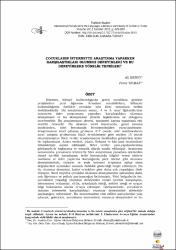| dc.contributor.author | Ersoy, Ali | |
| dc.contributor.author | Yılmaz, Ferat | |
| dc.date.accessioned | 2019-10-18T19:03:40Z | |
| dc.date.available | 2019-10-18T19:03:40Z | |
| dc.date.issued | 2015 | |
| dc.identifier.issn | 1308-2140 | |
| dc.identifier.uri | http://www.trdizin.gov.tr/publication/paper/detail/TWpVMU1Ua3hNUT09 | |
| dc.identifier.uri | https://hdl.handle.net/11421/11136 | |
| dc.description.abstract | İnternet, bilinçli kullanıldığında gerek çocuklara gerekse fırsatları yetişkinlere kullanıldığında özellikle çocuklar için kimi sorunlara neden olabilmektedir. Bu araştırmanın amacı, 4 ve 5. sınıf öğrencilerinin internette ödev araştırması yaparken karşılaştıkları olumsuz deneyimleri ve bu deneyimlere yönelik tepkilerinin ne olduğunu incelemektir. Bu araştırmanın deseni, tamamen karma eşzamanlı eşit statülü desendir. Bu desenin nicel boyutunda, genel tarama modelinden, Araştırmanın nicel çalışma grubunu 417 çocuk, nitel katılımcılarını nicel çalışma grubundan ölçüt örneklemeye göre seçilen 15 çocuk oluşturmuştur. Nicel veriler araştırmacılar tarafından geliştirilen anket ile toplanmıştır. Anket verileri, yüzde, frekans ve khi kare istatistiksel teknikleriyle analiz edilmiştir. Nitel veriler, yarı-yapılandırılmış görüşmelerle toplanmış ve tematik olarak analiz edilmiştir. Araştırma sonucunda, çocukların internette ödev araştırması yaparken istemeden cinsel içerikle karşılaşma, terör konusunda bilgiler veren sitelere rastlama ve ödev yaptırma karşılığında para isteme gibi olumsuz deneyimlerinin, cinsiyet ve evde internet erişimine sahip olma değişkenleri açısından anlamlı farklılık gösterdiği tespit edilmiştir. Bu üç olumsuz deneyimi, kızlar erkeklere göre daha çok yaşadığını ifade etmiştir. Nicel boyutta çocuklar olumsuz deneyimlerini ailesinden daha çok öğretmen ve polisle paylaşacağını belirtmiştir. Nitel bulgularda ise, çocukların yaşadığı olumsuz deneyimler cinsel içerikle karşılaşma, istenmeyen reklamlar, virüs, arkadaşlık isteği, sohbet isteği ve uygun bilgi bulamama olarak ortaya çıkmıştır. Görüşmelerde, çocukların tamamı internette karşılaştıkları olumsuz deneyimleri aileleriyle paylaştığını belirtmiştir. Bu araştırmadan elde edilen sonuçlardan yola çıkarak, gelecekte, çocukların internetteki olumsuz deneyimleri ve bu konudaki tepkilerine ilişkin ailelerin ve öğretmenlerin görüşlerini ortaya çıkaracak nicel ve nitel araştırmaların yapılabileceği söylenebilir | en_US |
| dc.description.abstract | Whilst the internet is providing new experiences for children and adults as a part of daily life, when used unconsciously it can cause some problems especially for children. This study aims to reveal the negativities that the 4th and 5th grade students face whilst they are researching their homework on the internet and what they do in this case. The design of the study is fully mixed concurrent equal status design. Survey method was used for quantitative dimension and phenomenology was used for qualitative dimension of this design. The quantitative study group of the research constitutes 417 children. 15 students were selected from quantitative study group according to criterion sampling for the interviews. The quantitative data were collected by a questionnaire developed by researchers. The questionnaire data were analyzed via percentage, frequency and chi square statistical techniques. Qualitative data of the study were collected by semi-structured interviews and analyzed by using thematic analysis. It was found that coming across sexual content whilst researching their homework on the internet, seeing websites giving information about terror and being asked money in exchange for doing homework differ according to variable of gender and having access to the internet at home. Girls expressed that they had more these negative experiences comparing with boys. In the quantitative dimension, children stated that they would share their negative experiences with polices and teachers rather than sharing with their families. In the qualitative dimension, it was revealed that negative experiences faced by children are coming across sexual content, unwanted advertisements, virus, friendship requests, chat requests, and not being able to find appropriate information. In the interviews, all of the children stated that they would share their negative experiences faced on the internet with their families. On the basis of the rsults of this study, it can be said that some qualitative and quantitative researches can be conducted for revealing the parents’ and teachers’ opinions about the children’s negative experiences and their responses to these experiences in the future. | en_US |
| dc.language.iso | tur | en_US |
| dc.rights | info:eu-repo/semantics/openAccess | en_US |
| dc.subject | Sosyal Bilimler | en_US |
| dc.subject | Disiplinler Arası | en_US |
| dc.title | Çocukların İnternette Araştırma Yaparken Karşılaştıkları Olumsuz Deneyimleri ve Bu Deneyimlere Yönelik Tepkileri | en_US |
| dc.title.alternative | Children’s Negative Experiences Faced On the Internet Whilst Researching Their Homework and Their Responses to These Experiences | en_US |
| dc.type | article | en_US |
| dc.relation.journal | Turkish Studies (Elektronik) | en_US |
| dc.contributor.department | Anadolu Üniversitesi | en_US |
| dc.identifier.volume | 10 | en_US |
| dc.identifier.issue | 11 | en_US |
| dc.identifier.startpage | 629 | en_US |
| dc.identifier.endpage | 650 | en_US |
| dc.relation.publicationcategory | Makale - Ulusal Hakemli Dergi - Kurum Öğretim Elemanı | en_US |
| dc.contributor.institutionauthor | Ersoy, Ali | |


















